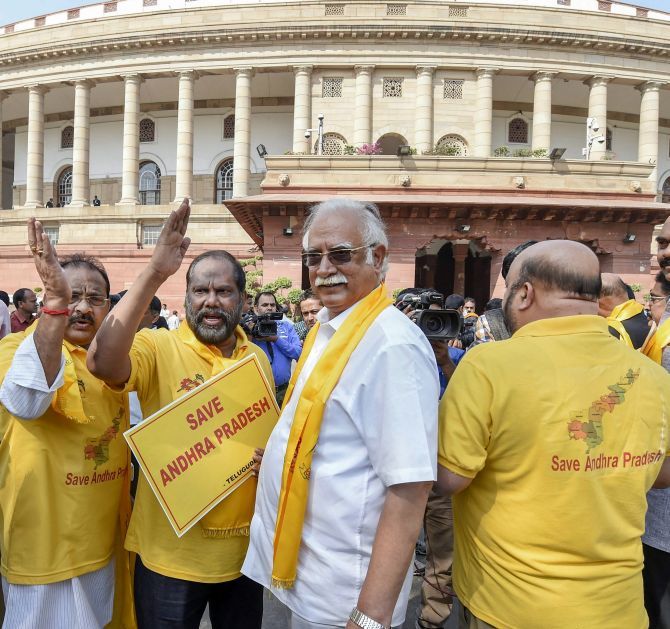Finance ministers from the southern states will discuss their concerns on the terms of reference of the 15th Finance Commission in Thiruvanathapuram on Tuesday.
'Every Finance Commission creates its winners and losers' point out T N Ninan.

IMAGE: TDP MPs, including former civil aviation minister Ashok Gajapathi Raju, protest outside Parliament demanding special status for Andhra Pradesh, March 9, 2018. Photograph: Kamal Singh/PTI Photo
Does the South protest too much?
Southern state chief ministers and ministers are getting together to protest against the terms of the latest Finance Commission.
For the uninitiated, such a Commission recommends every five years how much of central tax revenues should be shared with the states and, within that, what should be the share of each state.
The brief given to the new Commission is that it should take into consideration the 2011 Census, and not the 1971 Census numbers which were considered in previous Commission reports.
The last Commission had given weight to both 1971 and 2011.
The change has generated some heat because the southern states fear a triple whammy.
First, they have a better record of population control, and therefore will suffer in terms of their share of the tax revenue to be devolved from the Centre, if 1971 is replaced by 2011.
Second, they already lose out because greater weight is given to poorer states (income has so far got about twice the weight given to population).
And third, the goods and services tax, being a consumption tax, will deliver more revenue to the non-producing (poorer) states.
One writer has even said it is becoming 'almost untenable' for Kerala and Tamil Nadu to thrive in the Indian Union.
Some context is necessary.
Bihar gets a one percentage point extra share of central revenue, relative to its share of population.
Surely, that is not the end of the world, especially when it involves the poorest state in the country.
Besides, every Finance Commission creates its winners and losers.
Between the 11th and 14th Commissions, three of the southern states (the exception being the combined Andhra Pradesh) were significant losers in terms of share of central taxes. But northern and eastern states were also losers: UP, Bihar (including Jharkhand), West Bengal and Odisha.
The gainers included the western giants Maharashtra and Gujarat. So one should not jump to facile North-South conclusions -- especially since the Commission has also been asked to reward fiscal performance and population control.
A lurking fear behind the ringing of alarm bells today is that, come 2026, when the state-wise allocation of Lok Sabha seats comes up for review, the use of the 2021 Census as the population base could result in the southern states losing out in terms of number of seats, or share of an expanded seat total, in the House.
This too is an alarmist view.
Most states had between 1.4 million and 1.6 million electors per Lok Sabha seat in 2014, reflecting the national average of a little over 1.5 million.
Other than the north eastern states, there were few stand-outs, like UP with 1.74 million and, at the other end, Kerala with 1.2 million.
Equalisation of seats in 2026, on the basis of population, could reduce Kerala's representation from 20 Lok Sabha seats to 15.
Unfair, you say? Yes, because you penalise success.
But how fair is the current reality: For every 3.6 million electors, Kerala gets three seats, but UP only two?
Still, this is not a straight North-South issue. Karnataka has slightly more electors per seat than Bihar.
Himachal Pradesh and Jammu and Kashmir have the same figure as Kerala: 1.2 million electors per seat. Goa has barely half a million.
Taking the picture in its totality, there is little reason to expect radical change in the levels of Lok Sabha representation, such as to create a North-South cleavage.
Fairness also has a self-interest angle.
The heartland states have less lucrative tax bases, and are more dependent on central funds.
Devolution from the Centre accounts for a half or more of their total revenue; in Bihar's case, it is three-quarters. Whereas the southern states are dependent on the Centre for only a third of their total revenue.
The imbalance persists even after devolution, as seen in expenditure per head.
Without more resources, how do the poorer states improve their people's health and education indices, so as to achieve better population control?
It is that simple.












 © 2025
© 2025